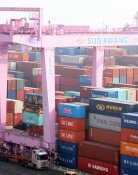[Editorial] Take A Look At Argentina
[Editorial] Take A Look At Argentina
Posted July. 13, 2001 09:40,
It seems that Argentina may declare the default as it is unable to pay more than $ 120 billion won debt. Amid increasing fiscal deficit, Argentina has repeated the vicious cycle of borrowing loans with the high interest rate to repay the foreign loans. The major reason for the fiscal deficit is that the profitability of the public companies has decreased, while the fiscal deficit has increased in the public field. In addition to this, economic policy, which was pushed forward since March, did not make substantial effects due to the political instability and the mistrust in politics derived from the coalition administration consisted of the `small ruling party and the big opposition party`.
If one traces the origin of the downfall of Argentina, once used to be called the `pearl of South America’ in the early 20th century, to a country with the repeated economic crises, one can come up with a conclusion that the populism, so-called the Peronism, has ruined the country. Peron, supported by the labor unions, accepted the demand for the unreasonable wage increase during his 10-year administration (1946-1955). Since then, Argentina’s economy has lost the competitiveness of industry due to the worsening of the structure of expense following the wage increase, and the fiscal deficit and inflation began to be deteriorated.
It is anticipated that even if Argentina can barely manage to overcome the current crisis, it will have to endure the slow economic growth, low living standard, and the decline of the foreign investment. Argentina is an opposite example of how the whole nation should be managed for the healthy economy. When the government and the people, who seek political stability, reasonable labor union, and endure the pain of restructuring, are integrated, the nation will not face an economic crisis.
Although South Korea experienced an economic crisis, basically, Korea differs greatly from Argentina because it is a net creditor nation and has sufficient growth potential due to the development of the IT related technology. However, unless the government raises the level of the international trust by continuing the restructuring of companies, no body can guarantee that Korea will not face an economic crisis again.
IMF warns that the economic crisis in Argentina may hit hard on newly rising economic nations. Moreover, exports and production of the East Asian countries, which experienced an economic crisis three years ago, have been dropping rapidly due to the economic stagnation of the U.S. and Japan.
Only restructuring of companies can be a bulwark against an economic crisis from outside. Especially, the joint efforts beyond the ruling-opposition party difference is essential with regard to economy, while watching out the populism as the next year elections are at near.







